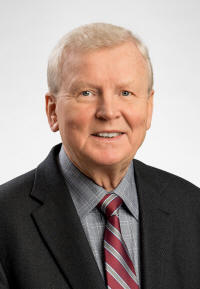
Roman Słowiński is a Professor and Founding Chair of the Laboratory of Intelligent Decision Support Systems at the Institute of Computing Science, Poznań University of Technology, Poland. Since 2003 he is also Professor at the Systems Research Institute of the Polish Academy of Sciences in Warsaw.
As a full member of the Polish Academy of Sciences, he served as its vice-president from 2019 to 2022. He was also the president of the Poznań Branch of the Polish Academy of Sciences from 2011 to 2018. From 2016 to 2019, he chaired the Committee on Informatics of the Polish Academy of Sciences. Since 2013, he has been a member of the Informatics Section of Academia Europaea, and in 2024, he was elected as a Foreign Correspondent Academician of the Academy of Sciences of the Institute of Bologna (L'Accademia delle Scienze dell'Istituto di Bologna).
Roman Słowiński has conducted extensive research on methodology and techniques of intelligent decision support, combining Operational Research and Artificial Intelligence. His interests are particularly focused on several key areas: addressing robustness in decision analysis; mining ordinal data; preference learning; and modeling uncertainty and imprecision in decision problems. He has also made significant contributions to rough set theory, fuzzy set theory, and evolutionary multiobjective optimization. His work extends to project scheduling, which encompasses multiple category resources, job modes, multiple criteria, and uncertainties. Furthermore, he applies his decision support expertise in medicine, technology, economics, and environmental studies.
As the author or co-author, he has published 16 books and more than 550 articles, including 350 papers in major scientific journals (Web of Science h-index=63, Scopus h-index=73, Google Scholar h-index=100). He advised 28 Ph.D. theses in Operational Research and Computer Science; his 16 former PhD students are professors in academia.
Roman Słowiński is highly ranked in the Stanford University World’s TOP 2% scientists of the World. He is no. 413 in the world, and no. 1 in Poland, in the ranking of computer scientists by Research.com. In the Google Scholar world ranking of Operational Research scientists, he got no. 20. Publications of Roman Słowiński can be found at: https://orcid.org/0000-0002-5200-7795.
Today Roman Słowiński is renowned for his seminal research on using rough sets in decision analysis. He started this work in 1983 with the founder of the rough set concept, the late Zdzisław Pawlak, and continued with Salvatore Greco and Benedetto Matarazzo since the early 90's. He organized the First International Workshop on Rough Set Theory and Applications that took place in Poznań in 1992.
Roman Słowiński has been holder of the European Chair at the University of Paris Dauphine, and invited professor at the Swiss Federal Institute of Technology in Lausanne, the University of Catania, Faculté Polytechnique de Mons, University of Michigan-Ann Arbor, Yokohama National University, Université Laval-Québec, University of Missouri-Columbia, University of Osaka, Polytechnique de Tours, École Centrale Paris, Karlsruhe Institute of Technology, and others.
Roman Słowiński is recipient of the EURO Gold Medal (1991), and Doctor Honoris Causa of six universities: Faculté Polytechnique de Mons (2000), Université Paris Dauphine (2001), Technical University of Crete (2008), Nanjing University of Aeronautics and Astronautics (2018), Hellenic Mediterranean University in Heraklion (2022), and University of West Attica in Athens (2024).
In 1997 he was given the Edgeworth-Pareto Award by the International Society on Multiple Criteria Decision Making and in 2005 he received the Annual Prize of the Foundation for Polish Science - regarded as the highest scientific honor awarded in Poland. In 2016, he received the Scientific Award of the President of the Polish Academy of Sciences. In 2020, Roman Słowiński was honored with the Scientific Award of the Prime Minister of Poland for creating a scientific school of Intelligent Decision Support Systems. In 2021, he got the Richard Price Award in Data Science from the International Academy of Information Technology and Quantitative Management. In 2022, he received the Humboldt Research Award by Alexander von Humboldt Foundation.
He was awarded Fellow grade by IEEE (the Institute of Electrical and Electronics Engineers - 2017), IRSS (International Rough Set Society - 2015, INFORMS (the Institute for Operations Research and the Management Sciences - 2019), IFIP (International Federation for Information Processing - 2019), IFORS (International Federation of Operational Research Societies - 2022), IAITQM (International Academy of Information Technology and Quantitative Management - 2022), AAIA (Asia-Pacific Artificial Intelligence Association - 2022), and AIIA (International Artificial Intelligence Industry Alliance - 2024.
The society of the 19th century Polish positivist Hipolit Cegielski gave him the title of “Outstanding Personage of Organic Work” (2017), and the City Council of Poznań awarded him the title of “Distinguished Citizen of the City of Poznań” (2018). In 2022, he was promoted by the Prime Minister of France to the rank of "Officier dans l'Ordre des Palmes Academiques" ("Order of Academic Palms"). In 2024, in a competition organized by EURO, he and his co-authors received the Best EJOR Paper Award in the Theory & Methodology category.
Since 1999, he is Coordinating Editor-in-Chief of the European Journal of Operational Research (Elsevier, CiteScore=11,9), a premier journal in Operations Research. In years 1998-2003, he was editor of Decision Analysis Section of the International Journal on Fuzzy Sets and Systems. He advises on editorial board of twenty scientific journals. He is coordinator of the EURO Working Group on Multiple Criteria Decision Aiding, Past President of the INFORMS Section on MCDM, and Past President of the International Rough Set Society. Moreover, in years 2009-2013, he has been an expert of the ERC panel (PE6 Computer Science).
Social activities: Since 2006, he has been a member of the Social Council at the Archbishop Metropolitan of Poznań; from 2006 to 2010, he was a member of the first Polish Council of the Aid to the Church in Need Association.
August, 2024